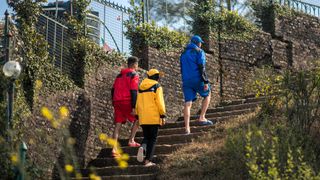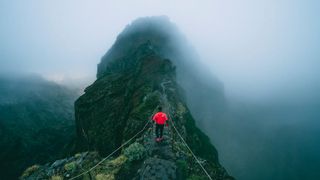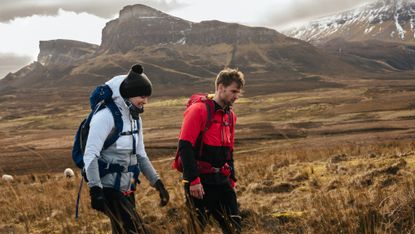Independent travel has never been easier. With the smartphone as your travel tool, it’s now possible to cut-out travel agents and plan your own trip entirely via apps like SkyScanner, Booking.com and AirBnB.
If you’re going on an adventure and trying to see as much as possible under your own steam, taking luggage you can carry in a hiking backpack, and even roughing it in a basic backpacking tent, is a given. But are you a backpacker or flashpacker?
- Make sure you're using the best suitcase
- This is the best carry-on luggage
- These are the best backpacks
What is flashpacking?
Flashpacking is backpacking with extra cash and ambition. Flashpackers are usually older and have a bigger budget than backpackers, and have probably done their fair share of budget backpacking in the past. Now they have jobs, plenty of money, and they’re short on time, but they still want to see the world properly, as they always have, and not superficially in resorts and posh hotels.
Flashpackers can also be young and adventurous types with a big budget and no intention of going near a dormitory.
So are you a backpacker or flashpacker? Here are seven differences between backpacking and flashpacking.
1. It’s all about disposable income
Flashpackers have more money than backpackers. Usually, it’s because they’re older, and have more disposable income. Maybe they didn’t get a chance to travel in their late teenage years or in their early twenties when money was tight, and now they’re trying to make up for it. Maybe they’ve always travelled independently, but now want more comfort than a dorm room offers. Or perhaps they’re just bored of resorts and generic hotels.
Either way, flashpackers have more cash, and have no problem parting with it when it’s for a good reason – and that means mostly for experiences, and rarely for five-star hotels.

2. Time is money
For backpackers on long trips, most likely gap years, the best way to travel is slowly. It’s cheaper to hang around in places rather than rushing around, and besides, that’s the best way to get a feel for a place.
For flashpackers, they usually have no choice; they’re short on time, but happy to pay whatever it costs to get around as many places – and have as many experiences – as possible. Flashpackers don’t get the same insight into a place, but they will eat in the best restaurants and will usually have completed a destination’s top activities within hours of arriving. Just as well, because they’ll probably leave in the morning.
3. Variety of accommodation
Staying in backpackers hostels can be fun, but there’s plenty of things to get irritated by if you’re staying in dormitories. Late-night parties, loud snorers, possessions that go missing… it all gets a bit tiresome and can begin to dominate a trip.
Flashpackers can get more variety; a backpackers hostel one night (probably in a private room), followed by an AirBnB or Home Stay for a few days, glamping in an expensive but unique treehouse/tipi/yurt, and yes, a few nights in a nice hotel as a reward before going back to work.

4. Getting off the beaten track
Travel long-term on a very tight budget and it’s really hard to get away from the road more often travelled. In many places – the most obvious being south-east Asia – there’s always a classic route, a beaten path, where backpackers get funnelled through. It’s where the cheapest places are, and where the buses, trains and minivans shuttle between.
Flashpackers can throw cash at a situation and book an organised tour deep into the wilderness, maybe visiting a remote village to experience authentic local lifestyles, customs and culture.
Backpacking is more about hanging out, while flashpacking is about getting things done.
5. Bucket lists and credit cards
Have you ever visited somewhere and discovered that the quintessential experience was something out of your budget? Maybe it’s a hot-air balloon ride, a top-notch restaurant, or an excursion to a historical site that requires hiring a private driver. Maybe you have a bucket list that includes things like scuba-diving, bungee-jumping or sky-diving. Those things are expensive, something that won’t trouble flashpackers on short trips with bigger budgets.
Backpackers have to prioritise when they splurge and when they save, and often have to make plans to re-visit somewhere when they’ve got the money to enjoy it properly.

6. Coping with disasters
Plans can go awry. Train staff can go on strike unexpectedly leaving you stranded at midnight in a strange city. A weather emergency can mean your plans have to change at a moment’s notice. In such scenarios, backpackers can really struggle, but overcoming it can make the trip. Isn’t travel about self-discovery?
A flashpacker won’t discover much about themselves at all, having jumped in a taxi and booked into a nice hotel without a care for how much it all costs. Isn’t that what credit cards are for? There are pros and cons to both types of travel.
7. Travel with technology
Although we’re all travelling with a lot of technology – at the very least a smartphone – backpackers never travel with a laptop. A flashpacker might bring one, and possibly a very expensive camera, too. Not to mention some pricey noise-cancelling headphones for their Premium Economy long-haul flight, some expensive merino wool t-shirts, and some quick-drying ‘travel underwear’ that cuts-down on luggage.
Flashpackers bring less stuff, travel light, and throw a credit card at any problem… such as a pair of hiking boots or an emergency warm layer. Backpackers tend to have baggage that would make most people wince, but as a result, can be virtually self-sufficient and be ready for any scenario.
Liked this?
- Best travel camera
- Make sure you're using the best suitcase
- This is the best carry-on luggage
- These are the best backpacks
- Carry-on suitcase vs backpack: which should you use for travelling?



